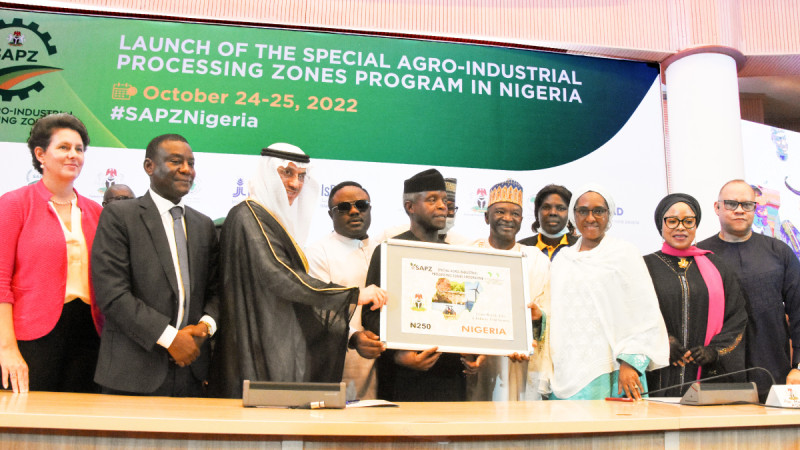The Federal Government has committed $538.05 million towards the establishment of Special Agro-Industrial Processing Zones (SAPZs) across Nigeria as part of a broader push to transform the country’s food systems, strengthen agricultural productivity, and drive inclusive economic growth. The initiative, which will be implemented with significant private sector participation, is expected to attract an additional $1 billion in investments by 2027.
Announcing the plan in Abuja during the Community of Practice Summit on the Comprehensive Africa Agriculture Development Programme (CAADP), the Minister of Agriculture and Food Security said the SAPZs are designed to boost local production, enhance value addition, create jobs, and improve food security nationwide. The first phase of the project has already been launched in Kaduna, Cross River, and Ogun states, with more locations set to follow.
The minister explained that the agro-industrial zones will serve as industrial hubs and agricultural transformation centres, supporting farmers and agro-entrepreneurs with modern infrastructure, mechanisation, and market access. As part of the wider plan to improve agricultural productivity, the government has also provided 2,000 tractors and related implements to strengthen production capacity.
Beyond boosting production, the SAPZ initiative aligns with Nigeria’s commitment to the CAADP and the Malabo Declaration by promoting value chain development, attracting investment, and building resilience within the country’s food systems. A new Agricultural Sector Working Group, comprising research institutions, development partners, private sector actors, and civil society organisations, has been set up to monitor progress, identify gaps, and ensure accountability in the sector.
The government is also advancing the Nigeria Postharvest Systems Transformation Programme (NiPHaST), an ambitious plan to tackle post-harvest losses estimated at ₦3.5 trillion annually. The programme aims to reduce waste, strengthen value chains, and improve national food sovereignty by improving storage, transportation, and processing systems across the agricultural sector.
Officials said that these interventions will support a more efficient, sustainable, and equitable food system, improving farmers’ incomes, reducing waste, boosting economic growth, and ensuring food security. The SAPZs are expected to create jobs, strengthen agribusiness value chains, and position Nigeria as a key player in regional and global agricultural markets.
Stakeholders at the summit also highlighted the importance of aligning national policies with continental priorities. The 2025 Kampala Declaration, which updates the CAADP framework, sets a renewed agenda for productivity, sustainability, and food security across Africa. Development partners, including Germany’s Federal Ministry for Economic Cooperation and Development (BMZ), have reaffirmed their commitment to supporting Nigeria’s agricultural transformation through funding, technical assistance, and policy collaboration.
Civil society groups called for stronger advocacy for increased agricultural budget allocations, timely fund releases, and improved expenditure performance. They also urged greater investment in rural infrastructure such as roads, irrigation systems, storage facilities, and markets, as well as enhanced support for women, youth, and persons with disabilities through secure land access, credit, inputs, and social safety nets.
Other key priorities outlined by stakeholders include strengthening local seed banks, promoting climate-resilient agriculture, improving access to extension services, adopting open data standards, and involving non-state actors in monitoring and evaluation processes. They also advocated for the domestication of the CAADP Kampala Declaration across all states and the allocation of at least 10 per cent of national and subnational budgets to agriculture.
The minister reiterated the federal government’s readiness to work closely with states, development partners, and private sector stakeholders to deliver on these goals. He stressed that strong collaboration and shared responsibility are essential to building resilient food systems and securing sustainable livelihoods for millions of Nigerians.
Germany’s Development Cooperation agency noted that its Sustainable Agricultural Systems and Policies project, implemented in nine countries across Africa and Asia, aims to link food security, climate action, and biodiversity conservation while ensuring that agricultural systems operate within environmental limits.
With the SAPZ programme, post-harvest reforms, and increased investment in infrastructure and innovation, Nigeria is positioning itself for a significant transformation of its agricultural sector, one that supports smallholder farmers, strengthens agro-MSMEs, reduces import dependence, and builds a more resilient food system for the future.










